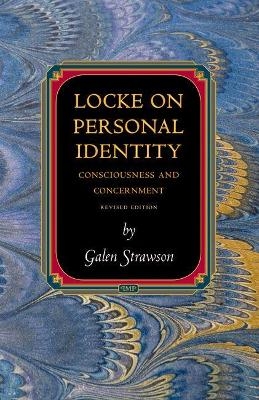
Locke on Personal Identity
Princeton University Press (Verlag)
978-0-691-16100-6 (ISBN)
- Lieferbar (Termin unbekannt)
- Versandkostenfrei innerhalb Deutschlands
- Auch auf Rechnung
- Verfügbarkeit in der Filiale vor Ort prüfen
- Artikel merken
John Locke's theory of personal identity underlies all modern discussion of the nature of persons and selves--yet it is widely thought to be wrong. In this book, Galen Strawson argues that in fact it is Locke's critics who are wrong, and that the famous objections to his theory are invalid. Indeed, far from refuting Locke, they illustrate his fundamental point. Strawson argues that the root error is to take Locke's use of the word "person" as merely a term for a standard persisting thing, like "human being." In actuality, Locke uses "person" primarily as a forensic or legal term geared specifically to questions about praise and blame, punishment and reward. This point is familiar to some philosophers, but its full consequences have not been worked out, partly because of a further error about what Locke means by the word "conscious." When Locke claims that your personal identity is a matter of the actions that you are conscious of, he means the actions that you experience as your own in some fundamental and immediate manner. Clearly and vigorously argued, this is an important contribution both to the history of philosophy and to the contemporary philosophy of personal identity.
Galen Strawson is professor of philosophy at the University of Texas at Austin. His many books include Freedom and Belief and Selves: An Essay in Revisionary Metaphysics.
Preface xi Chapter 1 Introduction 1 Chapter 2 "Person" 5 Chapter 3 "Person ... is a forensic term" 17 Chapter 4 Concernment 22 Chapter 5 Consciousness 30 Chapter 6 "Consciousness ... is inseparable from thinking "42 Chapter 7 "From the inside" 50 Chapter 8 "Person"--Locke's Definition 58 Chapter 9 Consciousness Is Not Memory 72 Chapter 10 Personal Identity 77 Chapter 11 Psychological Connectedness 88 Chapter 12 Transition (Butler Dismissed) 93 Chapter 13 "But next ... ": Personal Identity without Substantial Continuity 97 Chapter 14 "And therefore ... ": [I]-transfers, [Ag]-transfers, [P]-transfers 110 Chapter 15 "A fatal error of theirs" 119 Chapter 16 A Fatal Error of Locke's? 125 Chapter 17 Circularity? 131 Chapter 18 The Distinction between [P] and [S] 135 Chapter 19 Concernment and Repentance 139 Chapter 20 Conclusion 150 Postface 157 Appendix 1 "Of Identity and Diversity" by John Locke 163 Appendix 2 A Defence of Mr. Locke's Opinion Concerning Personal Identity by Edmund Law 233 References 253 Index 259
| Erscheint lt. Verlag | 21.7.2014 |
|---|---|
| Reihe/Serie | Princeton Monographs in Philosophy |
| Vorwort | Galen Strawson |
| Zusatzinfo | 4 line illus. |
| Verlagsort | New Jersey |
| Sprache | englisch |
| Maße | 140 x 216 mm |
| Gewicht | 312 g |
| Themenwelt | Geisteswissenschaften ► Philosophie ► Geschichte der Philosophie |
| Geisteswissenschaften ► Philosophie ► Philosophie der Neuzeit | |
| ISBN-10 | 0-691-16100-3 / 0691161003 |
| ISBN-13 | 978-0-691-16100-6 / 9780691161006 |
| Zustand | Neuware |
| Haben Sie eine Frage zum Produkt? |
aus dem Bereich


